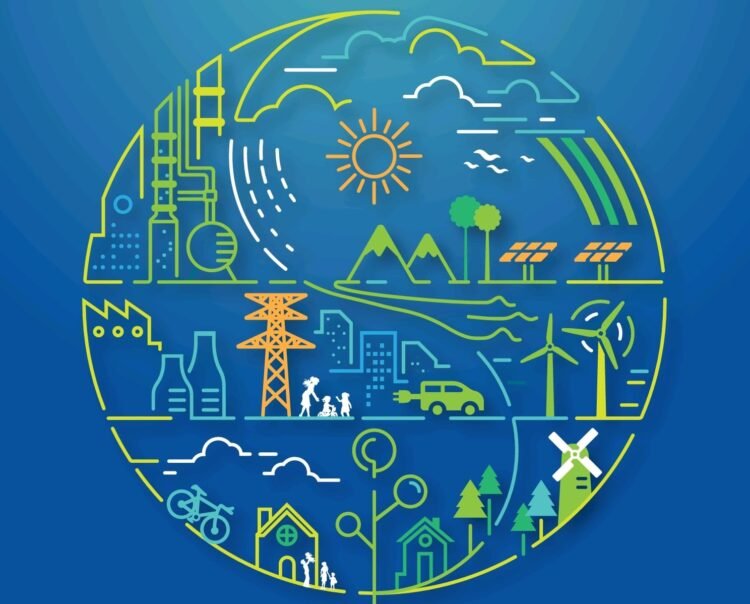Bank of Baroda’s latest green deposit product invites customers to participate in climate-positive investments, supporting renewable energy, clean water, and sustainable infrastructure.
MUMBAI (India CSR): As climate change accelerates and environmental responsibility becomes a priority, Bank of Baroda is introducing the “Bob Earth Green Term Deposit” to fund green projects that align with global sustainability goals. This innovative deposit product allows individuals to contribute directly to eco-friendly initiatives, making it possible for customers to support climate action while earning competitive returns on their investment.
What is the Bob Earth Green Term Deposit?
The “Bob Earth Green Term Deposit” is a sustainable investment product that channels deposits exclusively into projects aimed at reducing carbon emissions, enhancing energy efficiency, and promoting environmental stewardship. The primary objective of this product is to fund activities that mitigate climate change and foster ecological sustainability. By choosing this term deposit, customers are not only saving for the future but also helping finance projects that aim to combat global warming, support biodiversity, and reduce environmental degradation.
How the Green Term Deposit Supports Environmental Goals
The funds mobilized through the bob Earth Green Term Deposit are allocated based on Bank of Baroda’s comprehensive Green Finance Framework. This framework ensures that every rupee invested by depositors is channeled into projects with a positive environmental impact. The framework supports nine key sectors, each essential for a sustainable future:
- Renewable Energy: Investments support solar, wind, and other renewable sources, helping reduce reliance on fossil fuels.
- Energy Efficiency: Funding for projects that improve energy conservation, reducing overall energy consumption.
- Clean Transportation: Financing electric vehicles and sustainable transit solutions to lower emissions.
- Sustainable Water and Waste Management: Promoting clean water access, waste management, and recycling initiatives.
- Green Buildings: Supporting eco-friendly construction with lower environmental footprints.
- Biodiversity Conservation: Funding for projects that protect and restore natural habitats.
- Pollution Prevention: Investments aimed at reducing air, water, and soil pollution.
- Climate Change Adaptation: Funding projects that help communities adapt to climate-related impacts.
- Eco-Innovation and Green Technologies: Supporting new technologies that minimize environmental impacts.
Significant Financial Commitment to Renewable Energy
Bank of Baroda’s dedication to sustainability extends beyond its customer deposits. As of March 2024, the bank has a dedicated portfolio of INR 15,268 crore for renewable energy projects under its corporate credit segment. This substantial commitment is part of the bank’s strategy to align its lending practices with environmentally responsible goals and to support the transition toward cleaner energy solutions.
Incentives for Eco-Friendly Purchases and Green Financing
To encourage sustainable choices, Bank of Baroda offers special incentives such as a 25 basis points reduction in interest rates for electric vehicle loans. Additionally, the bank has introduced financing schemes for rooftop solar systems, promoting clean energy adoption among individuals and businesses alike. These products demonstrate the bank’s proactive stance in empowering its customers to make environmentally conscious decisions.
Sustainable Operations and Carbon Footprint Reduction
Bank of Baroda has integrated sustainability into its operations, adopting practices to reduce its own environmental footprint. A notable example is the bank’s commitment to renewable energy within its facilities, with 177 branches operating on solar power, reducing carbon dioxide emissions by approximately 3,500 tons annually. Solar panels have also been installed across 10 of the bank’s owned buildings, contributing a total of 123 KW in solar power capacity. The bank’s commitment to energy efficiency is further supported by LED lighting installed in all domestic branches.
Water Conservation and Waste Management
The bank has implemented water and waste management initiatives to minimize resource wastage. Rainwater harvesting systems are installed in key administrative buildings to support water conservation efforts. Additionally, waterless urinals have been introduced in multiple facilities, saving approximately 30 lakh liters of water per year. For waste management, the bank operates a biogas plant with a capacity to process 500 kg of wet waste at its BKC premises, producing cooking gas and organic manure, thereby reducing waste and supporting a circular economy.
Paperless Office and ESG Recognition
Furthering its commitment to sustainability, Bank of Baroda has digitized several internal processes through its paperless office initiative, contributing to significant reductions in paper consumption. These efforts have not gone unrecognized: Bank of Baroda’s ESG rating by Sustainalytics improved notably from 2023 to 2024, reflecting its progress in embedding environmental, social, and governance (ESG) practices across its operations.
A Commitment to a Greener Tomorrow
Through the bob Earth Green Term Deposit and other green initiatives, Bank of Baroda is setting an example in the banking sector by embedding sustainability into its core practices. By enabling customers to invest in climate-conscious projects, promoting renewable energy, and implementing eco-friendly operational changes, the bank is paving the way for a more sustainable future. This comprehensive approach not only reinforces its role as a responsible corporate citizen but also empowers its customers to contribute to global environmental goals.
Bank of Baroda’s initiatives, from the Green Finance Framework to customer incentives for green purchases, underscore its commitment to aligning financial growth with environmental responsibility, making it a leader in sustainable banking.
(India CSR)







